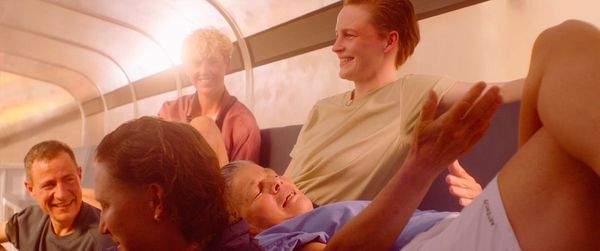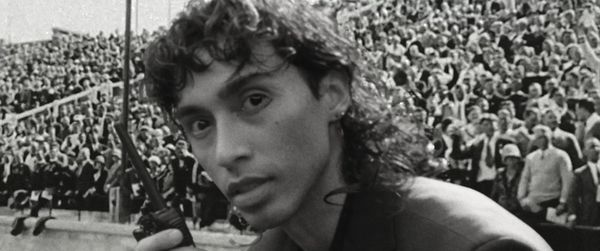 |
| Life Is Not A Competition, But I'm Winning. Director Julia Fuhr Mann: 'I try to look for collective or solidarity moments' Photo: Courtesy of Venice Critics' Week |
Given that so much of your film is about erasure from history, is there a specific story that triggered the desire to make it?
 |
| Julia Fuhr Mann: 'I studied documentary filmmaking, but I don't like documentaries which are only focused on the pain and suffering of individuals' Photo: Courtesy of Venice Critics' Week |
I watched Copa 71 this morning, which is another documentary about erasure, in this case of the Mexico Women’s World Cup in 1971. We continually talk about tipping points in the world, especially if we're female, or we're anywhere on the margins. There's this continual sense that ‘now things will change’. And you can see these women saying they thought, in 1971, things would change. And then the establishment closed ranks and nothing did change. I was wondering how you feel when you see something like the Spanish Football Federation chief Rubiales’ kissing story that’s been rumbling on. And again, people say we're at a tipping point. How do you feel about that?
AFM: I guess things do change because the media coverage and the interest and the audience is shifting, but I guess in the organisations, and at the top managing stuff, really not much is happening. And as long as this is not happening, all the structures behind it, and the rules and everything will stay the same. Also in the film industry. I'm doing a lot of activism for quotas and feminism. They keep saying, since the Fifties, that we don't need a quota, things will change by themselves if we change minds slightly. I don't believe it, we just have to exchange people in the top positions. We have to change the structures.
How did you select the stories that you wanted to choose because I assume you did have quite a lot to choose from?
AFM: For nowadays, we wanted to not focus on only one star like Caster Semenya, because we didn’t want to say it's like this one exception. So we didn't want to choose just one star. We didn’t want to just do an interview and that’s it, we really wanted to develop something with them. We were looking for people who were interested in exploring a different visual language and then joining our fictional crew and experiencing things together. For the archive, the same, actually. I was reading a lot of books and doing so much research and there were not too many stories we could first find and then afford the archival footage for, because it's super expensive and it's all exclusive rights, which are at the Olympic Committee or something. So it's really not affordable, and also there’s not much that’s digitised or archived at all. So I was reading about more stories, but I couldn't find that many in the archives.
One of the really interesting things that that I think comes across in your film, is this idea of men's excellence, the idea of being superior being a very celebrated thing, while if a woman is excelling or considered different in any way, including trans-athletes, that is used against them to bring them down. Was that something you really wanted to highlight?
AFM: Yes, but not only that. I'm also interested in the effect on the athletes themselves of the injustice, but I'm even more interested in if you watch sports that you learn so often that it's natural to have this binary, it's natural to have these categories. When telling this story about Michael Phelps, and then like women, how the difference is, it could make you think about whether this makes sense to have these differences. The goal was a little bit that the spectators start to question the categories.
I'm guessing that you would support a more subtle categorisation in athletics, less binary, more of a gradation so that people could compete in an inclusive way
AFM: Yes. I guess there's a lot of options. In the Paralympics, you also make categories, depending on the physical constitution people bring and doesn't have to be connected to gender at all. I would say nobody is comparable, actually, to one another. But you could measure some features you bring in and then make categories based on that. It's not too complicated.
I feel like your film is making an argument for collectivism as well, not so much for competing but maybe more for collective action or solidarity? Is that something that you would agree with?
AFM Yes, a lot. I studied documentary filmmaking, but I don't like documentaries which are only focused on the pain and suffering of individuals and then these individuals have to tell it, and maybe they cry, maybe the audience cries and you feel pity. For me, this feels like the intentions might be good, but sometimes it feels like keeping the structure as it is because it again gives only space in the film for telling about the violence again, and again, or showing it even again and again. So I try to look for, as you said, collective or solidarity moments and pictures and ideas of how to overcome the world as it looks at the moment.
 |
| Archive footage is used in the film. Julia Fuhr Mann: 'They kind of physically visit the people from the past who were pretty alone in what they did' Photo: Courtesy of Venice Critics' Week |
AFM:I'm really interested in a lot of queer cinema. And queer cinema often mixes time layers or doesn't want to show archive and then pretend like this is the gay the perspective on history, but more make clear that it's always a certain perspective you have. So we try to make this very clear that it's the perspective of our crew, and how they will tell the stories from the past, because they are obviously watching in the past. And also the solidarity and loneliness thing. They kind of physically visit the people from the past who were pretty alone in what they did. Technically, yes, it was difficult but we have a huge studio in the film school. We shot it in front of green screen. But we had a lot of advice on how to do this, so that the perspective fits.
Do you think that there's one thing that could be done that would make a huge difference in sports? Or do you think it's just that it's a whole series of changes that need to happen?
AFM I'm not not a sports organising specialist so I guess I can just do what I can do with films. So the goal for the film, I guess, is if some people are a bit confused, or not so sure, and what they thought before then I'm, I'm happy. And I guess that's one part of what helps to push change, at least
This was your graduation film, so congratulations on taking it to Venice. What are you planning next
AFM: I'm really looking forward to traveling to some festivals because I love connecting to audiences and to other filmmakers. So we have some queer film festivals, but also documentary and fiction, because it doesn’t fit into just one category. And I’m starting to develop the next project, which will be about revenge, feminist revenge.
Is that is that going to be a fiction feature?
AFM: No, it’s also a kind of hybrid, I would say.





















